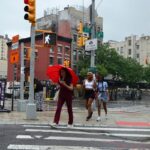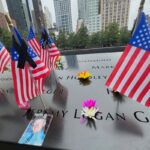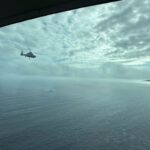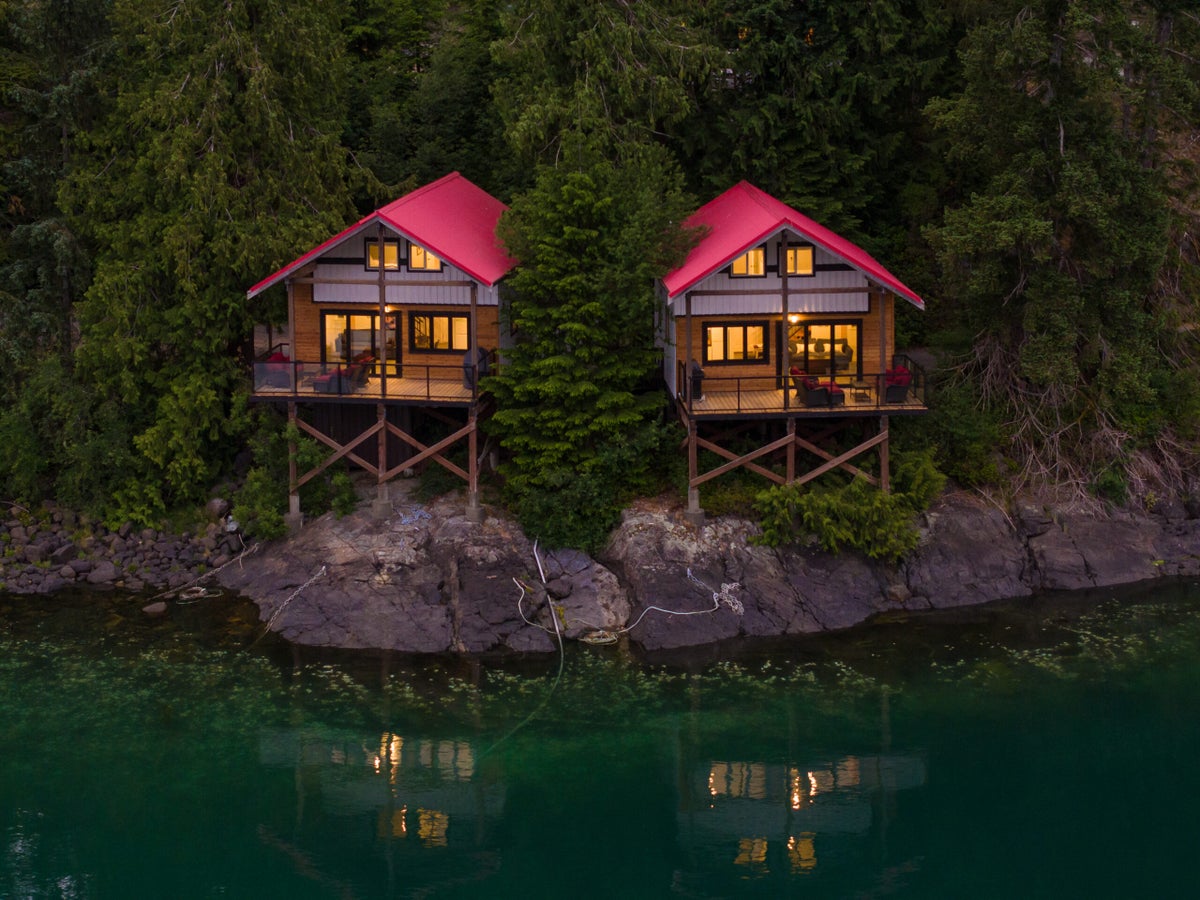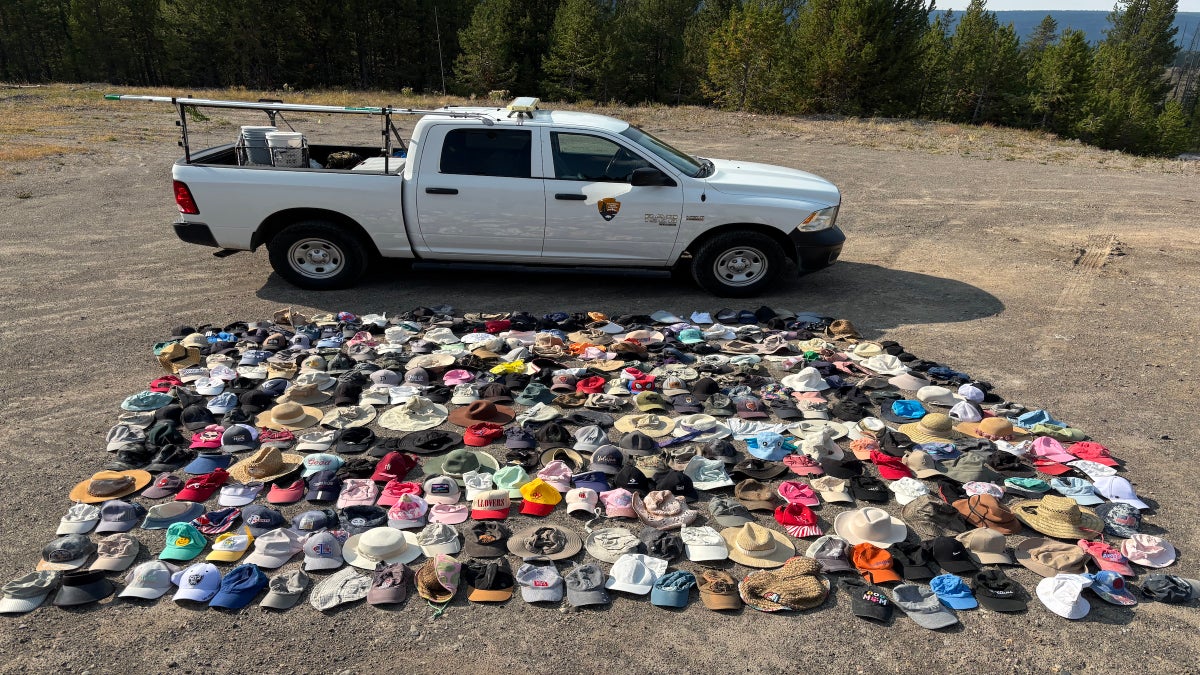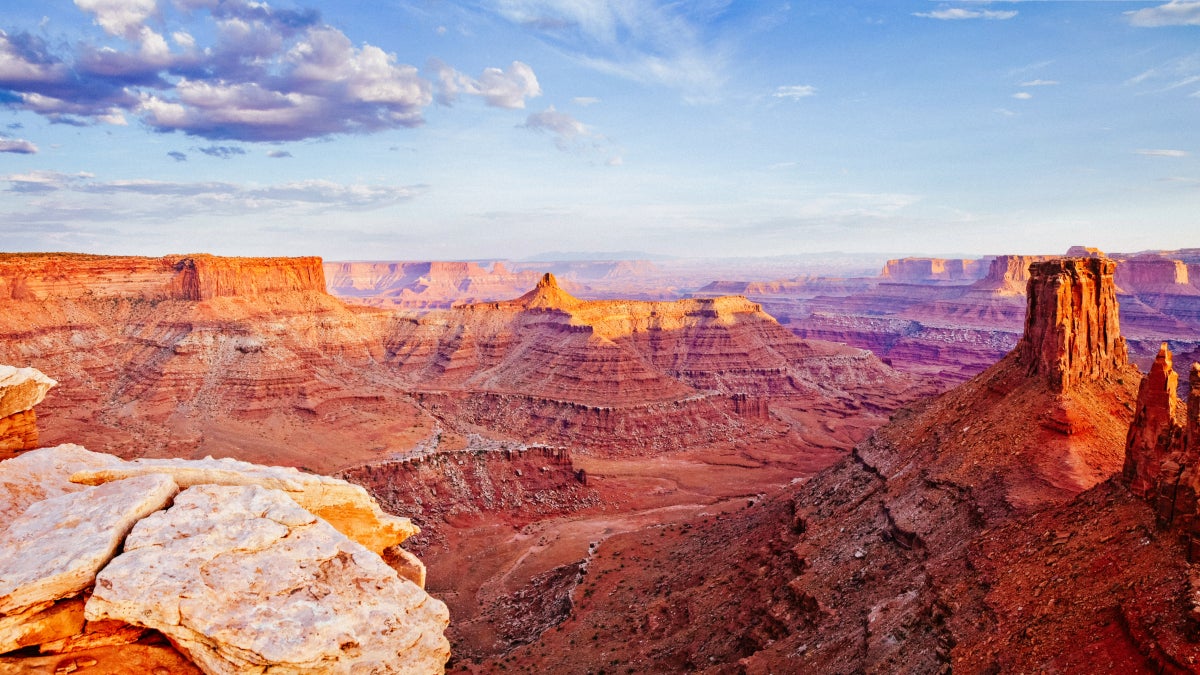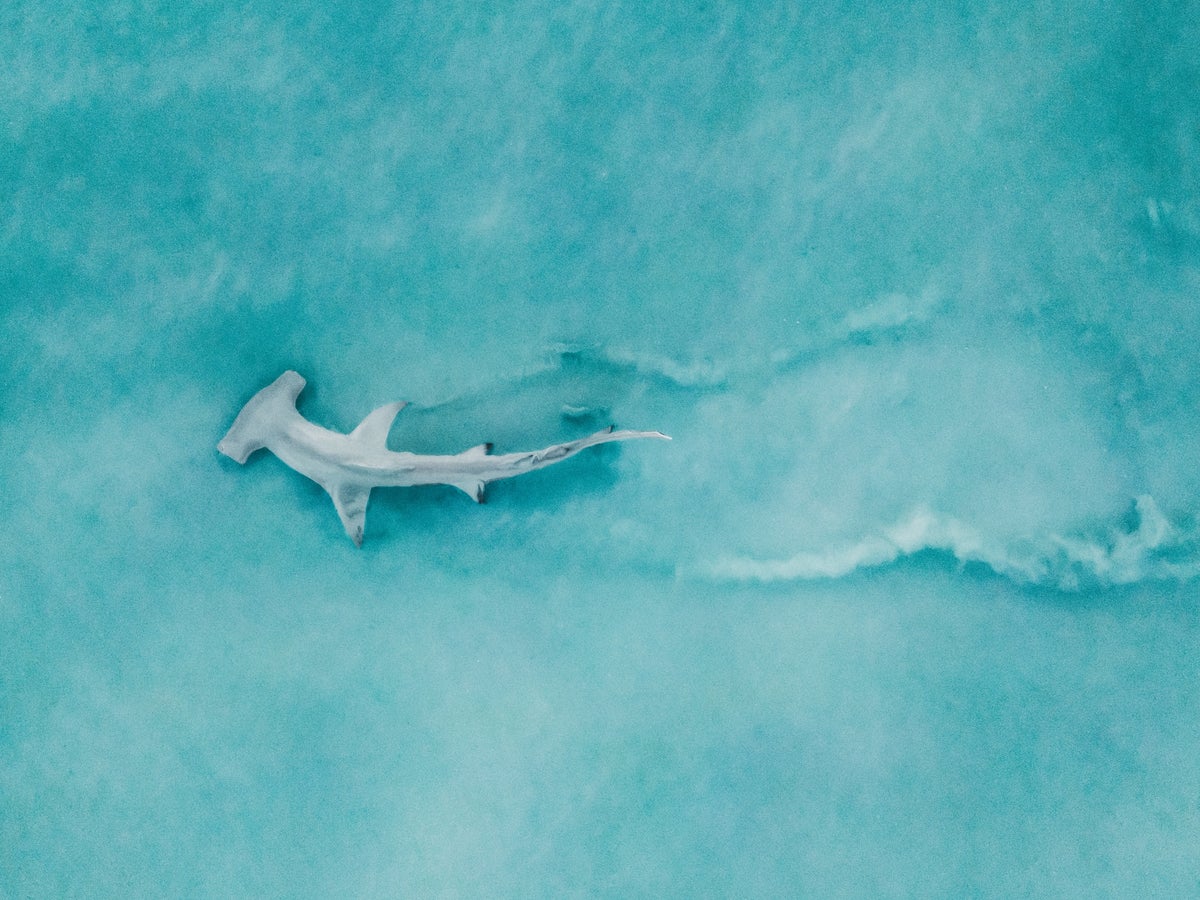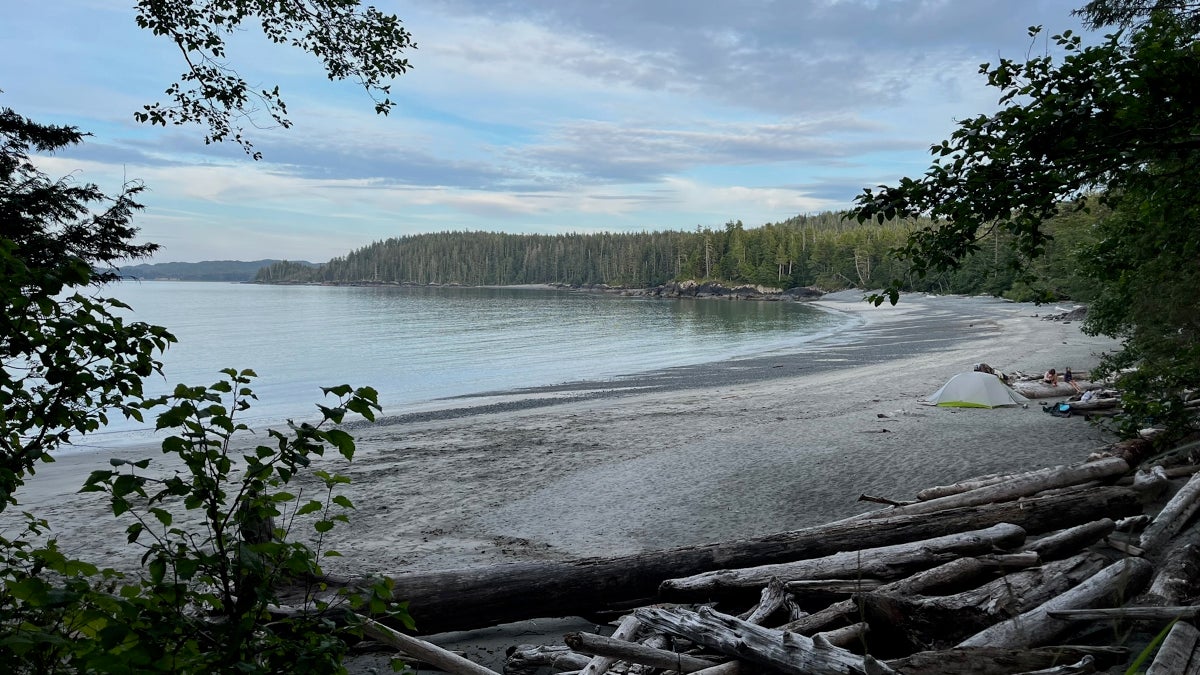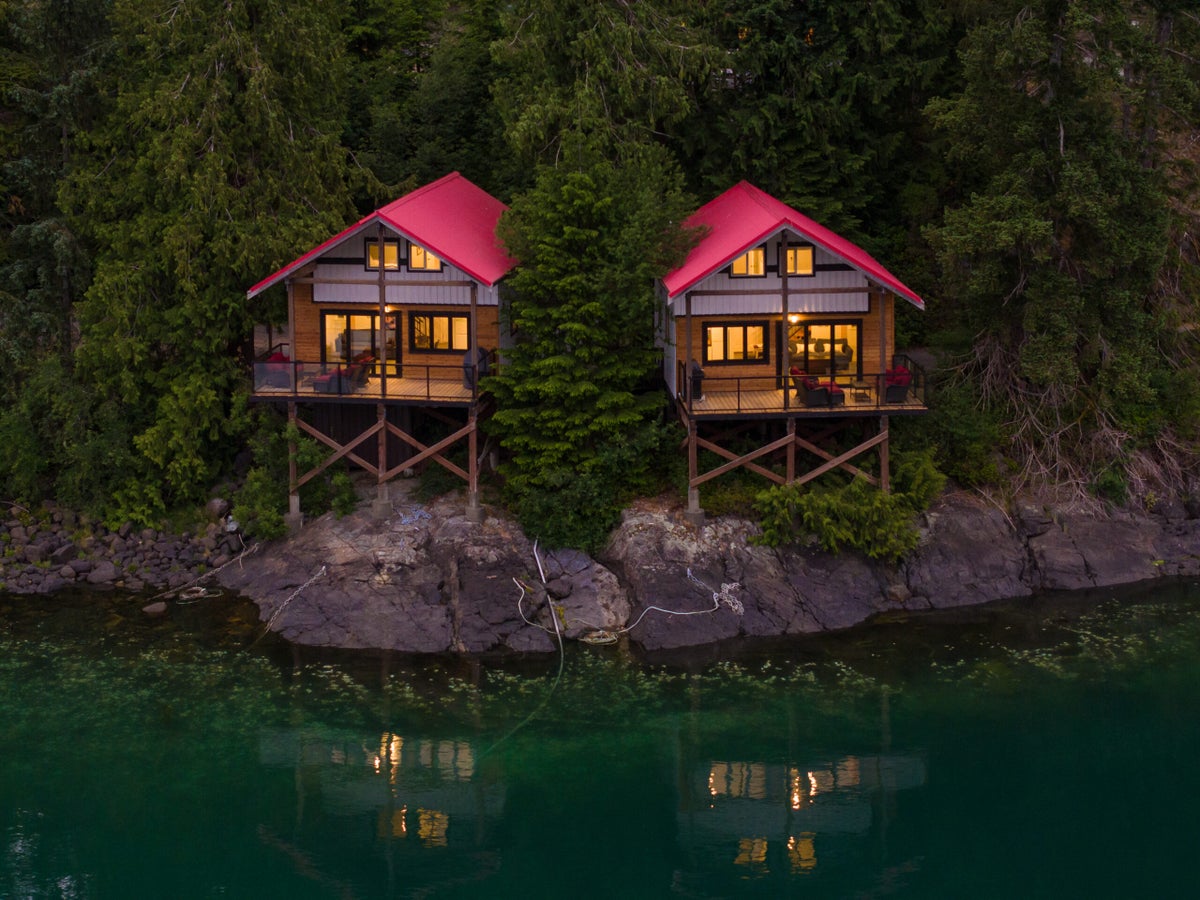
Ever come across an incredible hotel that stops you mid-scroll and makes you think, Wow, wouldn’t it be something to stay there? We do, too—all the time. Welcome to Friday Fantasy, where we highlight amazing hotels, lodges, cabins, tents, campsites, and other places perched in perfect outdoor settings. Read on for the intel you need to book an upcoming adventure here. Or at least dream about it.
After a long day of travel, I woke up and walked outside my cedar yurt overlooking the Nootka Sound on Vancouver Island. The still green water perfectly reflected the tree-covered hills and mountains on the opposite shoreline, as the heavy fog slowly gave way to sunlight. A few anglers prepped their boats for a day of fishing, while a lone sea lion briefly made an appearance before disappearing under the water. Two chatty kayakers paddled across the bay, while some double-crescent cormorants made a momentary appearance before disappearing into the fog. I could have sunk into a lounger and watched the scene for hours, but there were too much to get into here to stay idle any longer.
This July, I traveled more than 2,500 miles to catch some wild Pacific coho salmon and check out two fishing lodges I’d been hearing so much about. Moutcha Bay and Newton Cove Resort, both owned by Nootka Marine Adventures, are located on the coast of Vancouver Island in British Columbia, surrounded by Sitka spruce forests and the Pacific Ocean—and minutes from “salmon highway,” a prime spot to catch salmon on their migratory path June though September.
Lodging
The two lodges each have their own appeal. Moutcha Bay is a little bit fancier, with the cedar yurts and waterfront chalets almost demanding you slip into a fluffy robe, sink into a comfy chair, and stare out into the surrounding beauty. Newton Cove is more remote, only accessible by seaplane or boat. Comfortable outdoor seating areas, each surrounding a propane fire pit, encourage camaraderie among the anglers. It is the perfect spot for spinning stories about the ones that got away.
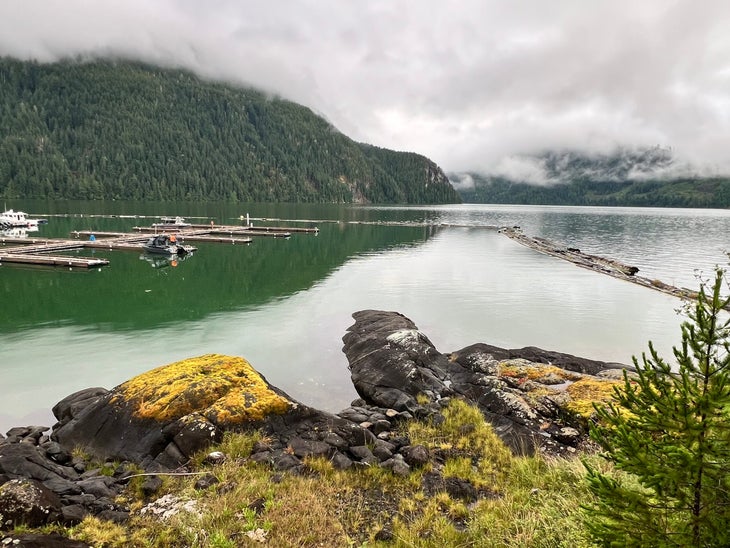
My first day on the water was mostly spent looking for bears and other wildlife, eventually making do with a gaggle of sea otters floating across the water and the occasional bald eagle overhead. The other boat passengers and I eventually made our way to Yuquot, a small First Nations village where we briefly chatted with Sanford Williams, a master carver of totem poles as he labored on his newest creation, and then hiked to a rocky beach where we had a light lunch.
After two nights at Moutcha Bay, I took a 45-minute boat ride to its sister property Newton Cove, a floating resort just off the Esperanza Inlet. At first glance, the surroundings seem a bit non-descript, but when I entered my room and the various common areas, I felt immediately comfortable, like being wrapped in a Winslow Homer painting. Everything was impeccably clean and well organized. Enjoying a cocktail around the fire pit in the evening, while watching the sun disappear behind the mountains and hearing the shoreline come alive with life, was a great way to cap the day.
Fishing Along Salmon Highway
I came all this way to fish, and it was finally the day. Rolling out in one of the resort’s fishing boats, we traveled where the fish had been biting recently, a stretch of unprotected water where the waves kept bouncing the front of the moving boat like an angry trampoline. I rarely ever get seasick when fishing, but by the time we reached our destination and began trolling, I was vomiting off the side of the 32-foot boat. But that wasn’t going to stop me from catching fish.
Soon I watched the fishing rod directly in front of me violently jerk up and down, signaling a fish had taken the bait, inadvertently setting the hook in its mouth. With wobbly legs, I stood up, grabbed the rod, and started reeling. The fish had other ideas though. As I took a quick rest, I watched as the line zipped off the reel, as the wily fish dove deeper into the ocean, trying to escape. For the next few minutes, I’d fight for a bit, then it would fight, and back and forth until the salmon had exhausted itself. I finally lifted my defeated adversary into the boat, and after a moment of compassionate unpleasantness, placed it in a cooler with the rest of the day’s fish.
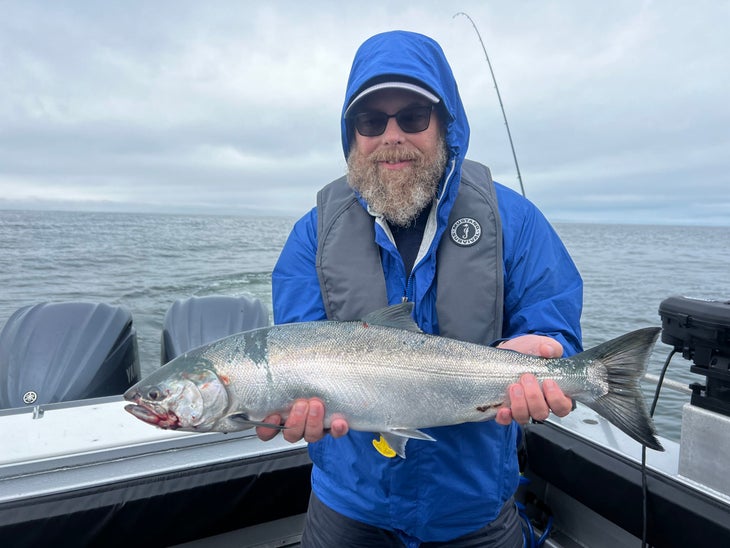
When fishing in British Columbia, you need to be cognizant of the province’s regulations. Chinook and coho salmon must be hatchery-raised and larger than 45 cm (17.7 inches) and 30cm (11.8 inches), respectively, to keep. You can keep a maximum of two per species per day. That meant that most of the fish we caught needed to return to the ocean. I reeled in at least a dozen while keeping three, while my buddy caught just as many and kept one massive chinook that had me green with envy (or maybe that was just the seasickness). Upon returning to Newton Cove, we compared our catches with the other boat that docked around the same time, happily sharing fish stories from our day on the water.
The resort staff will clean, filet, and freeze your catch, boxing it for your return trip home. The next time I’d see my coho would be on a plate, drenched in butter and lemon, atop a bed of asparagus, while the rockfish would be diced, seasoned with Tajin, and served on tortillas. I couldn’t help but smile, again.
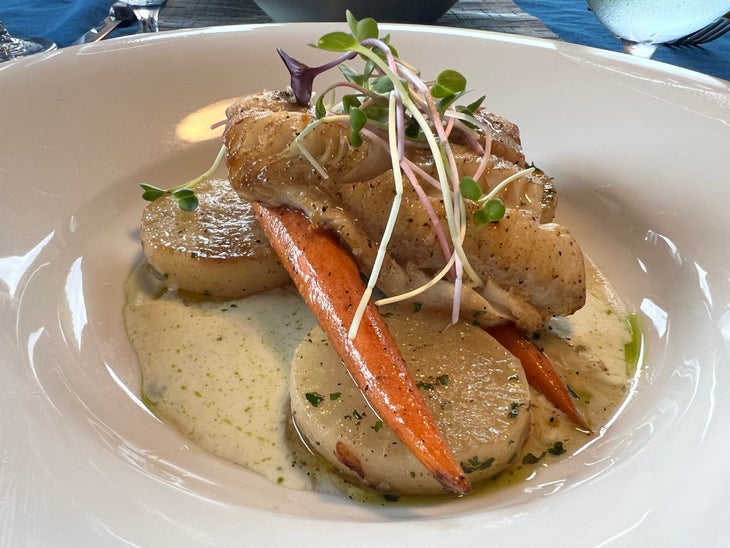
Adventure Intel
If you’re new to saltwater fishing, Nootka Marine Adventures offers an Anglers Academy which pairs guests up with experienced guides who will not only get you some fish, but also teach you about marine safety, how saltwater tides affect fishing, where to fish, and more. Upon graduation, there’s no cap-and-gown ceremony, but you will receive a discount on boat rentals during subsequent visits.
While fishing is the main attraction for both resorts, there are plenty of other options for fun. Folks driving to Moutcha Bay traverse the so-called Tree to Sea Drive from Gold River. The fairly rough gravel road is just over 36 miles, with Moutcha Bay around the middle, the Tahsis village at the terminus, and opportunities for adventure scattered throughout. I crossed at least a half dozen creek and river access points that made me kick myself for not bringing my fly rod and waders.
About 10 miles along the road, you’ll find a trail leading to Upana Caves, where you can do a self-guided tour through the caverns, leading to both a waterfall and an underground river. Given my rather crippling claustrophobia, I chose to ignore that sign, but luckily there are three other above-ground waterfalls along the route that you can hike to and capture some beautiful selfies in front of the flowing water.
Malaspina Lake is a great place to swim, fish for stocked rainbow trout, or watch wildlife like bald eagles, black bears, and the occasional cougar. Leiner River Recreation Site offers some fun hikes, while the Boulder Patch Trail leads to a popular rock-climbing spot along the river.
Wildlife watching is a must at the floating Newton Cove Resort. Start your mornings at the beach, looking for brown bears foraging for clams, sea lions, and various aquatic wildlife. Most boat rides also include a wildlife watching element, where you can see bears, whales, and sea otters among others.
Kayak and stand-up paddleboards are available to rent at both locations. Nothing beats a quiet, solitary paddle through gorgeous environments to get you centered and ready to start your day.
Room Intel
Moutcha Bay’s cedar yurts are gorgeous and modern, featuring a bedroom with an attached bathroom which is, in turn, also attached to the living room and kitchen area. A second bedroom is located in an upstairs loft. Massive windows look over the bay, but if you’d rather breathe in the sea air, you can relax on a lounger on the deck, which also boasts a grill and outside dining area.
For folks on more of a budget, Moutcha Bay offers a small campground with several waterfront sites as well.. The 28 RV-friendly sites have both water and power hookups and are located a short walk away from washhouses with flush toilets and hot showers
The rooms at Newton Cove are a bit more basic than Moutcha Bay’s yurts, but still very clean and comfortable. The scenery surrounding the resort makes it nearly impossible to not be outside enjoying it.
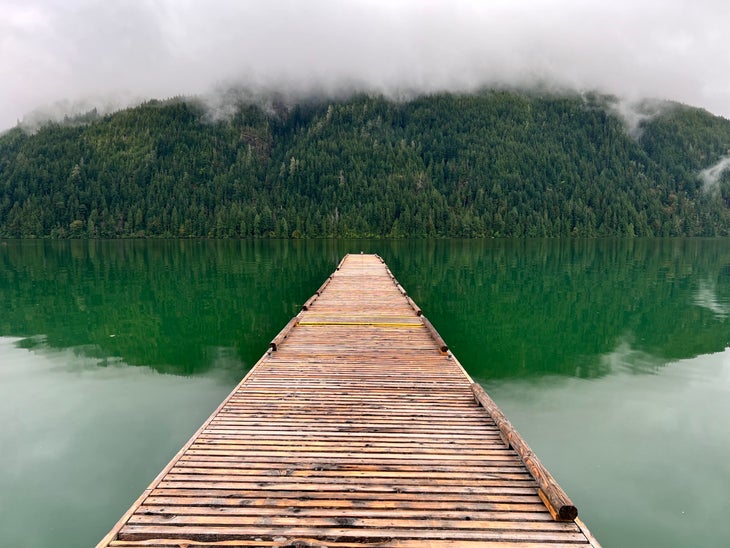
Eat and Drink
Being a floating resort makes food deliveries more difficult, so Newton Cove’s breakfast menus are fairly limited—omelets, breakfast sandwiches, and the like. While dinners are typically pre-prepared by the chef and customized based on allergies and dietary restrictions. During my visit, each three-course dinner was more amazing than the last. The perfectly prepared scallops were a personal favorite, as well as the steak and broccolini dish that served as my party’s send off. Meals and drinks are part of Newton Cove’s all-inclusive package, so you’re encouraged to get your money’s worth.
At Moutcha Bay, meals are a la carte, leaning heavily on upscale pub fare like ling cod tacos, tuna tataki, pizza, and poutine. (It’s still Canada, after all.) My friends and I paired our meals with a variety of Vancouver-area craft beers and custom cocktails.
If you ask the staff at either resort nicely, they may even cook your freshly caught fish that evening for your dinner.
When to Go
Moutcha Bay Resort is open from June to September, while you can stay at Newton Cove from July to September. July and August are generally the prime months for salmon fishing.
How to Get There
Fly into Comox (YQQ) on Vancouver Island, then drive approximately three hours to Moutcha Bay. The last 45 minutes to an hour will be on a lumpy dirt road, but the bumps and jostles will be worth the trip. Reaching Newton Cove requires a less than one-hour boat ride from Moutcha Bay. You can reach either resort by direct seaplane flight from Seattle, Vancouver, or Gold River.
Details and How to Book
Prices at Moutcha Bay start at around $949 CAD per person for a basic two-night stay, with a three-night stay with two days of self-guided fishing beginning at $1,849. Newton Cove rates begin at $5999 CAD for a three-night fully guided fishing trip in a private suite for two guests, three full days of guided fishing, fish processing services, and meals.
Nootka Marine Adventures offers standard itineraries for individual lodges, but they can also do custom bookings that include combinations of both Moutcha Bay, Newton Cove, and a third lodge, Nootka Sound.
The post These Remote Lodges Are a Dream Escape for Anglers and Wildlife Lovers appeared first on Outside Online.

